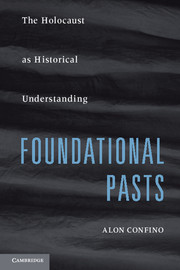5 - The Totality and Limits of Historical Context
from Part Two - Thresholds and Limits of History
Published online by Cambridge University Press: 05 June 2012
Summary
For all their subsequent historical importance, the French Revolution and the Holocaust were fashioned by human beings who acted close to the ground, amid the circumstances of unfolding events. From the perspective of origins and rupture we move in this chapter to the specific context that makes history. “Always contextualize!” is an often heard refrain among fellow historians. As an essence of historical explanation, it is an inseparable twin of “always historicize!” There is no doubt about the value of either imperative, but this only begs the question. For historians the question is not “to contextualize or not to contextualize.” Historians historicize and contextualize: this is what they should do for a living. Rather, the question is, What are the promises as well as the limits of historical context as an explanation? What can the context explain, and what can it not explain?
The issue of context has been at the center of the debates on the violence of the Terror and the Holocaust. It is quite remarkable to note the multiple associations that exist in the rhetoric, explanatory dilemmas, and mode of argumentation among historians of both events. Some of the associations are subterranean, others are more explicit, while still others demonstrate a touch-and-go state of semi-awareness. Take for example the following text of Robert Darnton from What was Revolutionary about the French Revolution:
Historians have succeeded in explaining much of [the Terror]…as a response to the extraordinary circumstances of 1793–1794…circumstances account for most of the violent swings from extreme to extreme during the revolutionary decade. Most, but not all – certainly not the slaughter of the innocents in September 1792. The violence itself remains a mystery, the kind of phenomenon that may force one back into metahistorical explanations: original sin, unleashed libido, or the cunning of a dialectic. I confess myself incapable of explaining the ultimate cause of revolutionary violence…these massacres took on the character of a ritualistic, apocalyptic mass murder.
- Type
- Chapter
- Information
- Foundational PastsThe Holocaust as Historical Understanding, pp. 83 - 96Publisher: Cambridge University PressPrint publication year: 2011

